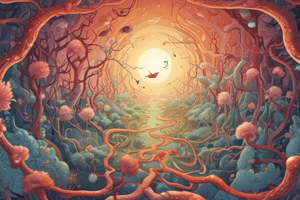Podcast
Questions and Answers
What is the study of the interactions between organisms and their environment called?
What is the study of the interactions between organisms and their environment called?
- Ecology (correct)
- Biochemistry
- Botany
- Microbiology
What is the level of organization that consists of a group of similar cells performing a specific function?
What is the level of organization that consists of a group of similar cells performing a specific function?
- Organ
- Tissue (correct)
- Organ system
- Molecule
What is the process by which cells generate energy from glucose?
What is the process by which cells generate energy from glucose?
- Homeostasis
- Photosynthesis
- Respiration (correct)
- Mitosis
Flashcards are hidden until you start studying
Study Notes
Definition and Scope
- Biology is the scientific study of life and living organisms
- It encompasses the structure, function, growth, evolution, distribution, and taxonomy of all living things
Branches of Biology
- Botany: study of plants
- Zoology: study of animals
- Microbiology: study of microorganisms
- Ecology: study of interactions between organisms and their environment
- Genetics: study of heredity and variation
- Biochemistry: study of chemical processes in living organisms
- Molecular biology: study of biological molecules and their interactions
- Biophysics: study of physical principles underlying biological processes
Levels of Organization
- Molecule: basic building blocks of life (e.g. DNA, proteins, carbohydrates)
- Cell: basic structural and functional unit of life
- Tissue: group of similar cells performing a specific function
- Organ: structure composed of two or more types of tissues
- Organ system: group of organs working together to perform a specific function
- Organism: individual living thing
- Population: group of organisms of the same species living in a specific area
- Community: group of different species living in a specific area
- Ecosystem: community of organisms and their environment
- Biosphere: all ecosystems on Earth
Biological Processes
- Metabolism: chemical reactions that occur within cells
- Homeostasis: maintenance of a stable internal environment
- Photosynthesis: process by which plants convert light energy into chemical energy
- Respiration: process by which cells generate energy from glucose
- Mitosis: process of cell division
- Meiosis: process of gamete formation
- Evolution: change in species over time through genetic variation and natural selection
Biological Molecules
- Carbohydrates: energy-rich molecules (e.g. sugars, starches)
- Proteins: molecules that perform a wide range of functions (e.g. enzymes, hormones)
- Nucleic acids: molecules that contain genetic information (e.g. DNA, RNA)
- Lipids: molecules that provide energy and structure (e.g. fats, oils)
- ATP: molecule that provides energy for cellular processes
Definition and Scope of Biology
- Biology is the scientific study of life and living organisms
- It encompasses the structure, function, growth, evolution, distribution, and taxonomy of all living things
Branches of Biology
- Botany is the study of plants
- Zoology is the study of animals
- Microbiology is the study of microorganisms
- Ecology is the study of interactions between organisms and their environment
- Genetics is the study of heredity and variation
- Biochemistry is the study of chemical processes in living organisms
- Molecular biology is the study of biological molecules and their interactions
- Biophysics is the study of physical principles underlying biological processes
Levels of Organization
- Molecules are the basic building blocks of life, including DNA, proteins, and carbohydrates
- Cells are the basic structural and functional unit of life
- Tissues are groups of similar cells performing a specific function
- Organs are structures composed of two or more types of tissues
- Organ systems are groups of organs working together to perform a specific function
- Organisms are individual living things
- Populations are groups of organisms of the same species living in a specific area
- Communities are groups of different species living in a specific area
- Ecosystems are communities of organisms and their environment
- The biosphere is all ecosystems on Earth
Biological Processes
- Metabolism involves chemical reactions that occur within cells
- Homeostasis is the maintenance of a stable internal environment
- Photosynthesis is the process by which plants convert light energy into chemical energy
- Respiration is the process by which cells generate energy from glucose
- Mitosis is the process of cell division
- Meiosis is the process of gamete formation
- Evolution is the change in species over time through genetic variation and natural selection
Biological Molecules
- Carbohydrates are energy-rich molecules, including sugars and starches
- Proteins are molecules that perform a wide range of functions, including enzymes and hormones
- Nucleic acids are molecules that contain genetic information, including DNA and RNA
- Lipids are molecules that provide energy and structure, including fats and oils
- ATP is a molecule that provides energy for cellular processes
Studying That Suits You
Use AI to generate personalized quizzes and flashcards to suit your learning preferences.




